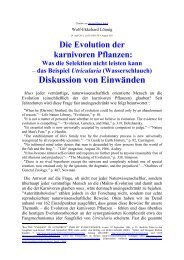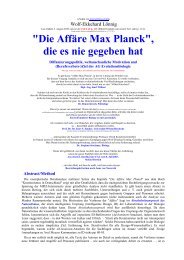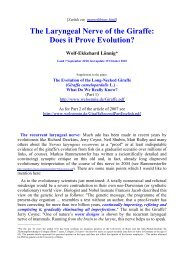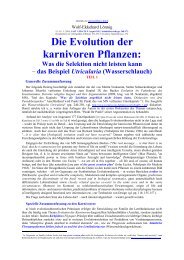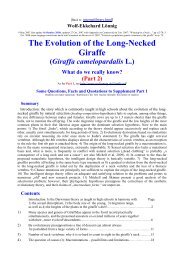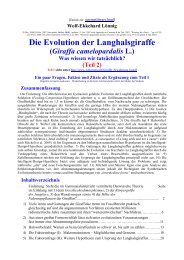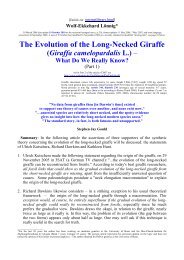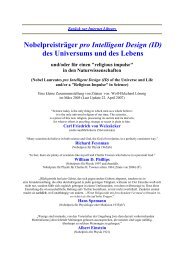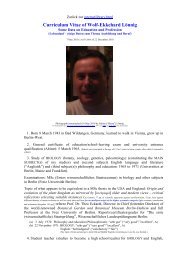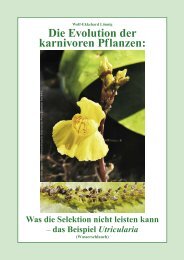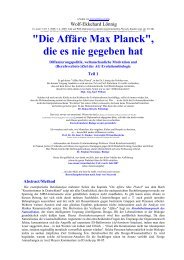3 Mutation breeding, evolution, and the law of recurrent variation
3 Mutation breeding, evolution, and the law of recurrent variation
3 Mutation breeding, evolution, and the law of recurrent variation
You also want an ePaper? Increase the reach of your titles
YUMPU automatically turns print PDFs into web optimized ePapers that Google loves.
<strong>Mutation</strong>s <strong>and</strong> <strong>recurrent</strong> <strong>variation</strong> 51<br />
“In spite <strong>of</strong> an enormous financial expenditure, <strong>the</strong> attempt to cultivate increasingly<br />
productive varieties by irradiation, widely proved to be a failure.”<br />
Also, <strong>the</strong> distinguished plant breeders Fischbeck, Röbbelen <strong>and</strong> Stutzer are<br />
in accord with <strong>the</strong>se statements (25):<br />
“The objectives <strong>of</strong> practical plant <strong>breeding</strong>, to achieve new opportunities <strong>of</strong> a<br />
gradual <strong>and</strong> continuous amelioration <strong>of</strong> tried <strong>and</strong> tested <strong>breeding</strong> varieties<br />
could...not be realized.”<br />
And especially concerning <strong>the</strong> neo-Darwinian concept <strong>of</strong> “micromutations”<br />
<strong>the</strong>se three authors continue (25):<br />
“Also, <strong>the</strong> modified concept <strong>of</strong> a direct use <strong>of</strong> so-called “micro-mutations” remained<br />
unsuccessful, because achievable <strong>breeding</strong> progress by this method distinctly<br />
lagged behind useful <strong>variation</strong>, which could be developed from <strong>the</strong> broad stream <strong>of</strong><br />
conventional recombination <strong>breeding</strong>.”<br />
Yet, perhaps one <strong>of</strong> <strong>the</strong> most astounding facts in <strong>the</strong> history <strong>of</strong> genetics<br />
appears to be <strong>the</strong> enormous gulf between <strong>the</strong> optimistic descriptions <strong>of</strong> mutants<br />
by so many authors active in plant <strong>breeding</strong> research during that period <strong>of</strong> time<br />
<strong>and</strong> <strong>the</strong> later "widely spread disappointment regarding mutation <strong>breeding</strong>" (66)<br />
due to <strong>the</strong> disconcerting reality, i.e. <strong>the</strong> meagre results obtained. Confirming <strong>the</strong><br />
observation <strong>of</strong> a ra<strong>the</strong>r strange distance between hypo<strong>the</strong>ses <strong>and</strong> reality, Micke<br />
continues his assessment after his calculations quoted above (explaining <strong>the</strong><br />
relatively few useful mutants achieved in mutation <strong>breeding</strong>) as follows (67):<br />
“In contrast to such rare achievements <strong>the</strong>re have been innumerable 'promising<br />
mutants' reported in innumerable publications, which never seem to appear again<br />
on <strong>the</strong> stage after <strong>the</strong>ir first presentation. Never<strong>the</strong>less, <strong>the</strong>re remains a respectable<br />
number <strong>of</strong> mutants which even <strong>the</strong> self-critical breeder or geneticist have seriously<br />
considered as progressive <strong>and</strong> <strong>of</strong> which only very few so far have contributed to<br />
<strong>the</strong> development <strong>of</strong> better crop cultivars.<br />
This experience has been disappointing to many, to those who worked with<br />
mutations <strong>and</strong> expected optimistically fast 'break-throughs' as also to those who<br />
watched <strong>the</strong> many mutation activities sceptically but never<strong>the</strong>less hoped that results<br />
would make <strong>the</strong> difficult task <strong>of</strong> plant breeders easier, at least in particular areas.”<br />
Micke also pointed out that nei<strong>the</strong>r <strong>the</strong> application <strong>of</strong> different mutagenic<br />
agents, nor various degrees <strong>of</strong> dosages, nor diverse modifying measures were able<br />
to revise <strong>the</strong> overall results: "The ultimate hope <strong>of</strong> obtaining more <strong>of</strong> <strong>the</strong> 'better'<br />
mutants has not been fulfilled" (67) (see also note 1 at <strong>the</strong> end <strong>of</strong> <strong>the</strong> paper).<br />
Synopsis<br />
According to <strong>the</strong> premises <strong>of</strong> <strong>the</strong> syn<strong>the</strong>tic <strong>the</strong>ory, explaining <strong>the</strong> origin <strong>of</strong><br />
<strong>the</strong> entire world <strong>of</strong> organisms predominantly by selected mutations, a<br />
worldwide r<strong>evolution</strong> in plant <strong>breeding</strong> research had been expected in <strong>the</strong> late



